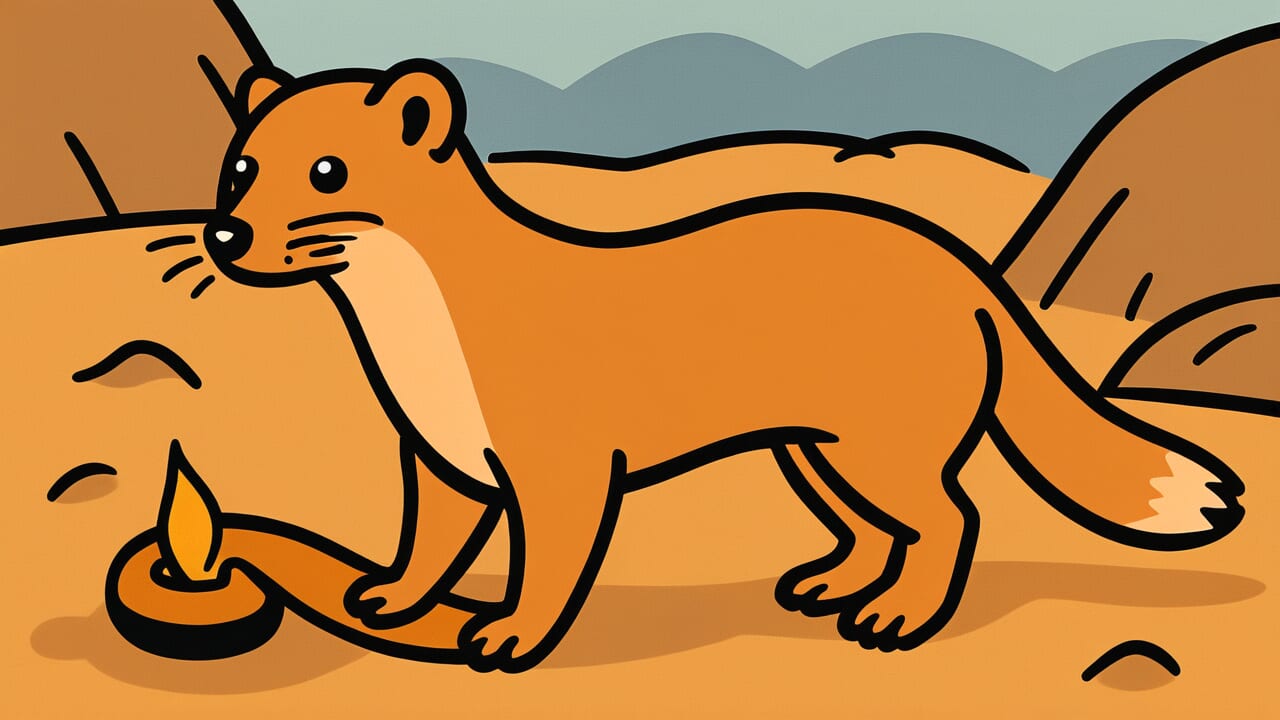How to Read “Becoming a weasel, becoming a marten”
Itachi ni nari ten ni nari
Meaning of “Becoming a weasel, becoming a marten”
“Becoming a weasel, becoming a marten” is a proverb that describes changing your attitude to suit your convenience based on position or situation.
It refers to people who act like completely different persons depending on who they’re with or what situation they’re in.
This proverb is mainly used in critical contexts. Someone acts like a submissive marten in front of powerful people, but like an ordinary weasel in front of those with less power.
Or they change their attitude depending on whether there’s profit to be gained. The proverb criticizes this kind of inconsistent, cunning behavior.
Even in modern society, many people act this way. They pretend to work hard in front of their boss, but treat subordinates arrogantly.
They’re friendly to people who can benefit them, but cold to those who can’t. When expressing people with such two-faced or multi-faced personalities, this proverb accurately captures their essence.
It’s used as a warning about behavior that damages trust in human relationships.
Origin and Etymology
Clear documentary records about the origin of this proverb are limited. However, the structure of the phrase reveals an interesting background.
“Itachi” (weasel) and “ten” (marten) are both animals from the weasel family. They look extremely similar, and even experts find them difficult to tell apart.
Weasels were known as relatively common animals. Martens, however, were prized for their high-quality fur.
During the Edo period especially, marten fur was believed to hold high value as decorative items for the samurai class.
The reason these two animals were chosen likely lies in their visual similarity. They look so alike at first glance that you can’t distinguish them.
Yet one is an ordinary animal while the other is a luxury item with contrasting values. This characteristic made them perfect for expressing how people switch their attitudes.
The repeated use of “nari” (becoming) emphasizes the image of constantly changing forms. Like an animal that transforms at will, the phrase captures humans who adapt themselves to different situations.
The idea of skillfully switching between two animals that look similar but have different values demonstrates the keen observation skills of the Japanese people.
Usage Examples
- That person works hard in front of the boss but slacks off with colleagues—truly becoming a weasel, becoming a marten
- Politicians changing their attitude before and after elections is a typical example of becoming a weasel, becoming a marten
Universal Wisdom
The proverb “Becoming a weasel, becoming a marten” has been passed down through generations. This is because it brilliantly captures two contradictory human qualities: adaptability and cunning.
Humans naturally possess the ability to adapt to their environment. Changing your attitude according to the situation can be seen as wisdom for surviving in society.
However, when that adaptability goes too far and becomes a tool for pursuing only self-interest, it transforms into cunning.
This proverb shows deep insight into human duality. Everyone, to some degree, changes their attitude depending on the person or situation.
It’s natural to have a different face with family than at work. But when that switching loses sincerity and becomes a means to deceive others, people lose trust.
Our ancestors saw through this subtle boundary. The difference between adapting and conveniently changing your attitude lies in whether you maintain consistent values and sincerity.
Even if your surface attitude changes, if the sincerity flowing at the bottom of your heart remains unchanged, that’s adaptation.
But if you change even your heart to use others, that’s cunning.
This proverb teaches us the essence of trust in human relationships.
When AI Hears This
In nature, there’s a principle that “medium-sized predators face the greatest disadvantage.” Weasels weigh around 200 grams, while martens weigh around 1 kilogram.
This size difference isn’t just about being big or small. It’s a turning point in survival strategy.
Small weasels enter narrow holes to catch mice. They consume little energy and can survive on small prey.
Large martens are good at climbing trees and can also eat bird nests and fruit. But what if there were a medium-sized individual?
It would struggle to enter holes and be poor at climbing trees. Yet being larger, small prey wouldn’t be enough.
In other words, “both strengths would be half-hearted,” creating the worst situation. They need more energy but have limited means to obtain it.
In ecology, such intermediate species are known to lose in competition and disappear. This is called “competitive exclusion.”
Through evolution, only clearly specialized species survive, while ambiguous intermediates are eliminated.
What’s interesting about this proverb is that it recognizes the same principle at work in human society.
People in organizations who change positions with “this and that” might actually be becoming intermediate species that no one relies on. The competitive principles of nature apply directly to human relationships.
Lessons for Today
This proverb teaches modern people the importance of “consistency in sincerity.” We live each day using various faces.
That itself isn’t a bad thing. What matters is whether the values flowing beneath remain consistent.
In modern society, the spread of social media has made our multifaceted nature more visible. Online and offline, workplace and private life—our various selves are recorded and compared.
That’s why having core sincerity rather than superficial attitude switching has become more important.
What you should strive for is not changing your attitude based on someone’s position or power. Treat your boss, subordinates, profitable contacts, and unprofitable ones all with the same respect.
This doesn’t mean “not reading the room.” It means behaving appropriately for each situation while never losing your sincerity as a person.
Trust cannot be built overnight, but it can be lost in an instant. Rather than switching between weasel and marten, have the courage to remain your unchanged self at all times.
That’s the path to building genuine trust relationships throughout your long life.



Comments